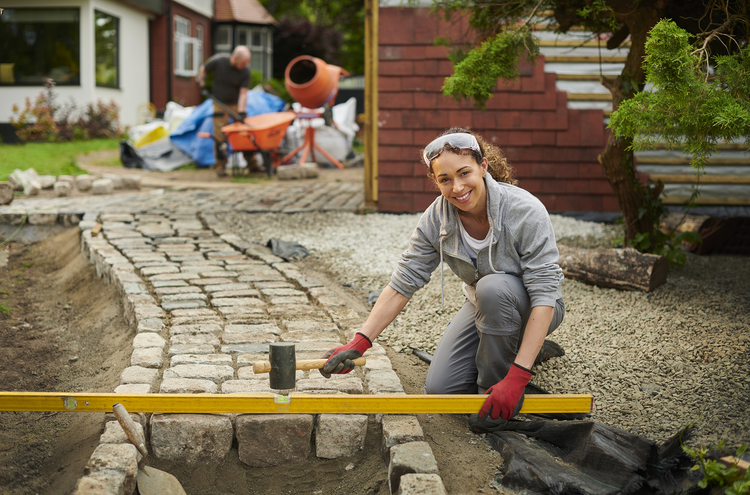This article was updated on August 8, 2024
Power washing offers plenty of opportunities for entrepreneurs of any expertise. Local communities have a high demand for pressure washing services, plus it requires low start-up costs for maximum profit potential. But if you're wondering how to start a pressure washer business, you've come to the right place.
With this handy guide to walk you through how to start a successful pressure washing business, you'll have your power washing company up and running in no time.
1. Study your potential market
The global pressure washing industry is a substantial business. It's currently valued at over $1.8 billion and is expected to continue to grow. This means you're likely to find people in your neighborhood who would take advantage of your pressure washing services.
Many surfaces benefit from a good, powerful cleaning regularly, including:
- Buildings
- Porches
- Decks
- Sidewalks
- Driveways
- Pools
- Fences
- Solar panels
You're not limited to residential areas. The commercial districts in your town or city also need a good pressure cleaning. The key is to establish how many pressure washing businesses already exist. This can help you determine if there's room in the market for you. If you believe that space exists for another cleaning business, ask yourself the following questions to ensure that you can grab your share of the available clients:
- What do the existing businesses offer?
- What can you do differently / better within your power washing company?
- How do the other cleaners price their services?
- What does the other company's business structure look like?
- Why would clients choose you instead?
The answers to these questions can help guide you as you develop your pressure washing business plan and practices.
2. Understand the Pressure Washing Industry
Before even naming your business, it's important to understand the economics of the pressure washing industry to ensure your venture has the potential to provide the profits needed. To determine how quickly your cleaning service can become profitable first list out anticipated expenditures such as:
- Cost to get the right equipment like a pressure washer, chemicals, attachments, and vehicles
- The expense to find a potential customer based on your marketing strategy
- Pressure washing insurance and pressure washing license costs
Next, consider the rate you will charge for each service. Estimate the number of service calls you can realistically respond to in a given time period and determine the total revenue. To calculate the profitability potential, subtract your expenditures from your anticipated revenues. This important exercise will highlight the number of customers needed to be profitable and even areas where expenses could be reduced.
3. In-depth Equipment and Service Details
Choosing the right equipment and offering a diverse range of services can set your business apart from other pressure washing businesses.
Types of Pressure Washers
Understanding the different types of pressure washers is essential for selecting the right equipment for your business:
- Gas vs. Electric Washers:
- Gas Washers: These are more powerful and suitable for large-scale or commercial cleaning tasks. They are ideal for roof cleaning, surface cleaner applications, and heavy-duty jobs where higher water pressure is required.
- Electric Washers: Typically quieter and more suitable for residential work, electric washers are perfect for tasks like soft washing delicate surfaces and smaller jobs.
- Hot Water vs. Cold Water Washers:
- Hot Water Washers: More effective at cutting through grease and oil, making them ideal for commercial kitchens or industrial sites.
- Cold Water Washers: Suitable for most residential cleaning tasks, including house washing and general surface cleaning.
Essential Accessories and Equipment
To provide comprehensive services, invest in essential accessories and additional equipment:
- Surface Cleaners: These are attachments that can clean large, flat areas more efficiently than a standard pressure washer nozzle. They are perfect for driveways, patios, and decks.
- Hose Reels: A hose reel helps in managing the pressure washer hose, preventing tangles and extending the life of the hose.
- Cleaning Solutions: Use environmentally friendly cleaning solutions that are effective yet safe for the surfaces you are cleaning. Different jobs may require specific cleaning agents, so keep a variety of products on hand.
Niche Services to Differentiate Your Business
Offering specialized services can help differentiate your business from the competition:
- Roof Cleaning: This involves using a gentle washing technique, often referred to as soft washing, to clean roofs without damaging shingles. It's a highly sought-after service that can set your business apart.
- Gutter Cleaning and Maintenance: Offering gutter cleaning as an add-on service can attract customers looking for comprehensive exterior cleaning.
- Commercial Services: Expand your services to include commercial properties, offering specialized cleaning for storefronts, parking lots, and industrial buildings.
4. Establish a legal business
The next thing you must do is establish a legal business. This involves some fun and some tedious work. However, once you have everything in order, you'll be able to start gathering customers.
Naming your business
Your business needs a name to put on all of the legal paperwork and on your marketing materials. When choosing a name for your business, Forbes recommends:
- Avoid names that are difficult to spell
- Make sure no other business has the same name
- Use descriptive words
- Tell a story
- Get feedback from others on the name
You want a catchy name, one that people will easily understand and remember the next time they have a pressure washing job.
Get all necessary paperwork in order
Once you have workshopped your name ideas and settled on the perfect option, it's time to make everything legal and official. You'll need:
- Business license - Depending on where you live, the required licensure you need to start a power wash business will vary. You should check your state's small business website for up-to-date details about local requirements.
- Tax ID - You'll also need to choose an appropriate business structure (ex: c corporation, sole proprietor, LLC) and apply for an Employer Identification Number (EIN) from the IRS. This number identifies your business and allows you to file taxes for the pressure washing company.
- Business insurance - Since you'll be handling hefty equipment and working on homes and businesses, you must acquire business insurance. You might need several types of insurance, including general liability, equipment, and property. If you have employees, you'll need insurance to protect them too.
Open a business bank account
Once you've completed your business paperwork, you'll have to open a bank account to handle all of your business finances. As a small business owner, it's important to keep these separate from your personal affairs for legal and tax purposes. Some banks offer special benefits for business accounts, so don't hesitate to ask questions when you set up your account.
5. Acquire the needed equipment
Third on our pressure washing business tips: power washing equipment. There are three key categories of equipment you must have to run a power washing business. These include:
- Pressure washing equipment - You'll need a pressure washer (or washers), hoses, nozzles, pumps, and cleaners.
- Uniforms - Uniforms speak to a business's professionalism and polish. To help create a consistent sense of branding and team cohesion, try designing a standard shirt or another identifying uniform piece that you and all of your employees wear. This makes you easily recognizable to all of your clients and instills trust in your reputation.
- Van or truck - Finally, you'll need to purchase or rent a vehicle to transport your pressure washing equipment from place to place.
The cost of all of this equipment can vary widely. In total, the initial investment for transportation, initial marketing, power washer equipment, and insurance is around $10,000. It'll be more expensive to purchase all of these materials new rather than rent or buy used items. You may be able to find used pressure washers and vehicles in good working order. You might even find someone local who's trying to unload extra equipment that you could use on Nextdoor, where local community members can buy or sell items from their neighbors.
6. Set up your company's fee structure wisely
Now it's time to decide how much you want to charge for your services. Your rates might vary based on:
- The type of place you clean (residential vs. commercial property, house, deck, driveway, roof cleaning, window cleaning, etc.)
- The difficulty level of the cleaning
- Competitor prices in your local area
As you sit down to determine your fees, ask how much money you need to make to:
- Turn a profit - While it might not be profitable right away, you should have a target in mind of when the business should get out of the red. Plot out how many customers you'll need to reach this goal and at what rate.
- Pay employees - If you're the only person doing the work, you only need to worry about paying yourself. However, you'll be able to take on more customers and expand your pressure wash business if you have help. Budgeting for expansion is a must.
- Handle business expenses - Finally, you must structure your fees so that you have enough income to pay your business expenses. Equipment repairs, insurance, and advertising costs are always going to be part of running your power wash business.
7. Marketing Strategies and Customer Acquisition
To build a successful power washing business, it's crucial to develop a comprehensive marketing strategy that not only builds an online presence but also leverages online reviews and local community engagement.
Building an Online Presence
In today's digital age, having a strong online presence is essential for any business. Here's how to establish and optimize your online footprint:
- Website Development: Create a professional website that clearly outlines your services, pricing, and contact information. Include a blog section where you can share tips on house washing, roof cleaning, and other cleaning tasks. This helps in SEO and positions you as an expert in the field.
- Search Engine Optimization (SEO): Use relevant keywords like “pressure washer rates” and “power washing service” throughout your website content. This helps improve your search engine ranking, making it easier for potential customers to find you.
- Social Media Engagement: Establish profiles on platforms like Facebook, Instagram, LinkedIn, and Nextdoor. Share before-and-after photos of your work, customer testimonials, and tips on maintaining clean surfaces. Nextdoor is particularly valuable for home professionals, as it connects you directly with your local community. Use these platforms to run promotions, share updates, and interact with your community.
Leveraging Online Reviews
Positive online reviews can significantly impact your business' reputation and attract new customers. Here’s how to encourage and manage reviews:
- Ask for Reviews: After completing a job, ask satisfied customers to leave a review on your Google My Business page or other review sites. Make it easy by providing direct links to your review pages.
- Respond to Reviews: Engage with your customers by responding to reviews, both positive and negative. Thank customers for their feedback and address any concerns raised by dissatisfied clients to show your commitment to customer satisfaction.
Participating in Local Events
Local events are an excellent opportunity to promote your business and connect with potential customers:
- Community Sponsorships: Sponsor local sports teams or community events. This not only helps build brand awareness but also demonstrates your commitment to the local community.
- Trade Shows and Fairs: Set up a booth at local trade shows or fairs. Use this opportunity to showcase your services, demonstrate your equipment, and offer special discounts for event attendees.
Setting Up a Referral Program
A referral program is a cost-effective way to acquire new customers through word-of-mouth:
- Offer Incentives: Provide discounts or free services to customers who refer new clients to your business. This encourages your existing customers to promote your services to friends and family.
- Track Referrals: Implement a system to track referrals, ensuring that both the referrer and the new customer receive their rewards. This can be managed through a simple tracking form or software.
8. Market your business
Now that you've established your business and financial structure, it's time to start reeling in customers. There are many methods you can use to get the word out. One thing to keep in mind is that a power washing business is a local company. A successful pressure washing business starts with connecting with your community, so aim to reach people who are near you, not hundreds of miles away.
You should strive to focus your marketing budget on local crowds for the best results:
- Good work - Sometimes, the best advertisement is a job well done. Just ask Scott Anderson of Spoon River Pressure Washing . As he was working on a house, a neighbor actually approached Anderson to book a pressure washing service. To make it easy for neighbors to introduce themselves or seek out your services, keep business cards on hand, consider adding a branded decal to your vehicle with your contact information, or offer a discount to clients who will allow you to put up a yard sign that says something like "This House Made Even More Beautiful by [Business Name] Pressure Washing Services."
- Nextdoor - It's incredibly simple to claim your free business page on Nextdoor . Once you do so, you can utilize Nextdoor's hyper-local ad services and engage 1-on-1 with your neighbors through Business Posts.
- Online presence - Pressure cleaning videos have become a huge trend in recent years, with satisfying videos of the cleaning process becoming popular online. Setting up your business website and social media accounts to showcase your before/ after work can attract prospective customers.
- Ad management -Running local ads is a great way to market your business and make it more visible to the neighborhood. Consider setting up a Google my business account to list out available services, locations, and contact info. Further, you can put some budget in online advertising such as Google ads and Facebook ads to directly target your community.
- Word of mouth - Don't discount the strength of word-of-mouth advertising to help grow your pressure wash business. After you've set up your Nextdoor business page, your neighbors can share their recommendations and experiences with your business with others. Nextdoor is an extremely valuable resource for local businesses. You can network, advertise, and interact with customers all in one space.
9. Look for partnerships in your local community
A new business needs a village to help it succeed — that's especially true for a pressure washing business. Offer your services at a price reduction to other local businesses that may uniquely benefit from having a trusted partner in the pressure washing business. That can include:
- Real estate agents and home stagers
- Contractors and building development companies
- Homeowners associations
- Rental companies
- Painting companies
- Gutter-cleaning businesses
So, where do you find these potential new partners in your business venture? Right on Nextdoor. Nextdoor offers a digital space for your real-life local businesses to connect and build each other up. You can search for nearby small businesses in the categories above and make connections directly through the app.
From there, a mutually beneficial relationship can result in increased profit margins and a deeper connection to your community for both you and your partnering businesses.
10. Learn from the power washing pros
When starting your power washing business, there are plenty of resources out there to help you master the craft.
- Online tutorials offer a variety of tips and tricks to help you hone your skill and learn a few industry secrets.
- Power washer associations can help you connect with other professionals in your area to swap techniques and find new ways to make the job easier. Reach out to the following organizations to see how you can get involved:
- United Association of Mobile Contract Cleaners
- Pressure Washing Resource Association
- Power Washers of North America
11. Follow customer-friendly policies
Lastly, as your business grows, keep in mind that your customer service is the key to keeping and gaining clients. Some ways you can keep your customers happy as a small business owner include:
- Make it easy for customers to schedule your services
- Ensure that your work is of the highest quality
- Offer special discounts with Nextdoor Ads
- Give referral specials to neighbors who help spread the word
- Ask for and respond to customer feedback
- Network with other local businesses
When you create a business that your customers can trust and use a hyperlocal platform like Nextdoor, you'll find that your business can grow and thrive quickly.
Maximize your local business's potential with Nextdoor
A power washing business is a frequently in-demand entity. Many residential and commercial surfaces require regular cleaning by a skilled individual. If you're ready to fill that void in your neighborhood, then following our six tips can help you get started.
Nextdoor for business can take you from newcomer to neighborhood go-to with our easy-to-use tools. We have simple solutions to help you connect with your neighbors. Our top-notch marketing tools will make targeting your ideal potential customer.







